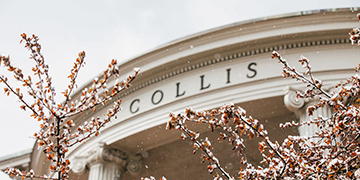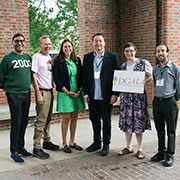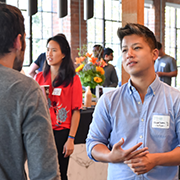Professor Jerry DeSilva: Committed to Lifelong Learning
“To me, if you came to Dartmouth, you’re a Dartmouth student forever,” says this year’s recipient of the John Rassias Award.

The Alumni Council recently honored Professor of Anthropology Jerry DeSilva for his ardent dedication to teaching all generations of the Dartmouth community.
The Professor John Rassias Award for Faculty Commitment to Lifelong Learning, established in 2017 and presented annually by the Alumni Council, recognizes current or recently retired faculty members who have gone above and beyond to stay connected to Dartmouth graduates. DeSilva received the 2024 Rassias Award during the council’s 229th session in Hanover.
“Alumni relish opportunities to stay in touch with our amazing faculty beyond graduation, whether it’s listening to them present at Reunions, participating in an online discussion, or speaking with them at a regional club,” says Alumni Council President Cheryl Shepard ’90. “Having faculty like Jerry DeSilva share their knowledge, research, and enthusiasm with us and our families underscores the fact that Dartmouth is a lifelong community.”
DeSilva is a paleoanthropologist specializing in the evolution of the early humans. His particular expertise, the human foot and leg, has expanded the world’s understanding of how upright walking evolved.
Like Rassias Award recipients before him, DeSilva believes his teaching should extend to all members of the Dartmouth community, even long after they have received their diploma. He has led two Dartmouth Alumni Travel trips to South Africa, given presentations to five Reunion classes, and spoken at several Dartmouth on Location events. He has appeared in multiple videos and, in partnership with Dartmouth’s Learning Design and Innovation team, he developed a DartmouthX online course exploring why humans walk on two legs rather than four.
DeSilva shares why he rarely turns down an opportunity to speak to Dartmouth alums.
Teaching and conducting research are enough to keep any faculty member busy. Why are you involved in so many alumni activities?
My background is in science education. I started as an educator at the Boston Museum of Science before I got my PhD. Science literacy is really important to me. I love talking with groups about the science that I do, the questions I ask, the nature of evidence, how we know what we think we know about our evolutionary history. These are also learning opportunities for me. It has been really stimulating and inspiring to talk with folks who ask questions that make me say, “Whoa, I wouldn’t have thought of it that way. Let me digest that.” Maybe two weeks later, I’m teaching a class on campus and that pops into my head again, and my students and I have that conversation.
And you enjoy it?
I love it. About the only time I say no to a request is when I know I’m going to be traveling. It’s part of our responsibility to continue to educate beyond graduation. To me, if you came to Dartmouth, you’re a Dartmouth student forever. I really do buy into that and very much believe in the idea of a lifelong learner.
Does it help that you’re an expert in a field that many people find fascinating?
One hundred percent. Everyone loves fossils. Everyone loves primates, monkeys, and apes. And everyone has this curiosity about where we came from. Those things mesh together in the science that I do. If I’m boring a crowd about fossils and apes, then I’m doing something wrong.
Do you have a favorite memory from an alumni event?
I was leading a group of students in South Africa in 2016, and we made sure that our time there intersected with a Dartmouth Alumni Travel group that was there. We had a class of 15 students and an alumni group of about 15. We had a big braai, a South African barbecue, and the students took the alumni through these caves where I do a lot of my research in looking for early human fossils. There was this sort of magical moment of me being able to step back and let my students become the educators for this alumni group. It was fabulous.
Do you stay in touch with alumni informally, too?
I have a few former students who email me when there has been a new discovery and they’ll say, “Hey, I just saw this in The New York Times, and it made me think of your class.” That makes my day.
What are your thoughts about receiving this year’s Rassias Award?
It’s rejuvenating. As an academic, I have ups and downs, and I sometimes wonder whether the work I’m doing is impactful or not and whether the public outreach that I’m passionate about is it having the effect that I want it to have. The award makes me realize that the time I’ve invested in alumni events has been worth it.
Do you have any observations to share about the Dartmouth alumni community?
I’ve never seen anything like it. I can honestly say to my students, “You will forever have these networks. You are a member of the Dartmouth community for life.”






